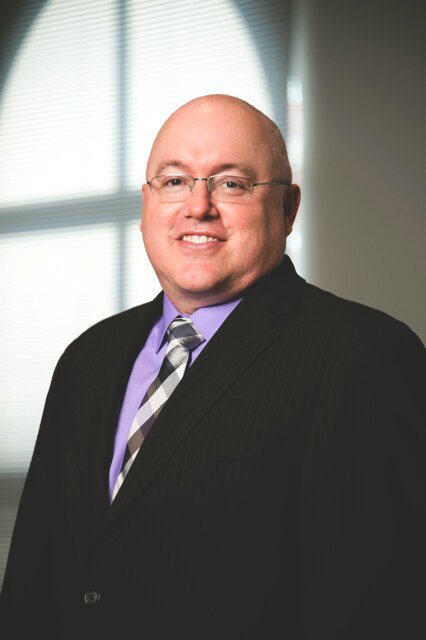The Brightpoint Development Fund (BDF) exists to create economic opportunities for communities, families, and individuals who lack access to affordable capital and financial services. Since 2010, the nonprofit organization has provided consumer lending, financial education, housing rehabilitation and development, and small business loans.
 Steve Hoffman, President and CEO of BrightpointSteve Hoffman, president and CEO of Brightpoint says the organization serves 14 counties in Northeast Indiana, providing opportunities and resources to help remove the causes and conditions of poverty. In their state code, Indiana allows for payday lending, although not every state does, and many are turning away from doing so. Hoffman hopes the CLC can encourage other types of payday lending models that aren’t predatory.
Steve Hoffman, President and CEO of BrightpointSteve Hoffman, president and CEO of Brightpoint says the organization serves 14 counties in Northeast Indiana, providing opportunities and resources to help remove the causes and conditions of poverty. In their state code, Indiana allows for payday lending, although not every state does, and many are turning away from doing so. Hoffman hopes the CLC can encourage other types of payday lending models that aren’t predatory.
“In Indiana, we have a special provision on our code that allows payday lending loans. These are loans that are short terms of two weeks. People have to pay them back, and they pay large fees, approaching $100 every two weeks,” Hoffman says. “People can’t magically repay the principal and that fee in two weeks, and they renew that loan, on average, six times. What they’re doing is paying about 365 percent APR on these loans, and it’s a debt trap. It’s predatory lending, and it affects lower-income people disproportionately. It’s definitely a target for us to try to stop, and try to keep people from going to this product. We’re trying to work on it from an advocacy perspective, but also a market perspective, which is what the CLC program is about.”
Typically, borrowers are using these advance payday loans to help cover their necessities like rent, electricity, heat, and everyday expenses like groceries.
Matt Crouch, vice president of community economic development of Brightpoint, spoke about the history of the Community Loan Center (CLC), which was started in Texas by another Community Development Financial Institution (CDFI).

 Matt Crouch, Vice President of Community Economic Development of Brightpoint“Around 2014-2015, Brightpoint started becoming involved and eventually became a franchisee of the Community Loan Center,” Crouch says. “This is where we, along with Homestead over in the West Lafayette area, and now more recently, another Community Action Agency in Northwestern Indiana, have become franchisees of this.”
Matt Crouch, Vice President of Community Economic Development of Brightpoint“Around 2014-2015, Brightpoint started becoming involved and eventually became a franchisee of the Community Loan Center,” Crouch says. “This is where we, along with Homestead over in the West Lafayette area, and now more recently, another Community Action Agency in Northwestern Indiana, have become franchisees of this.”
Since its inception, the program has provided 4,867 loans totaling $4,672,796. The CLC sets up employers and employees for free to have access to the loans. There are safeguards in place, to help prevent negative financial impacts for borrowers.
“We make sure that the amount they’re paying on a monthly basis does not exceed a certain percentage of their take-home pay. We don’t want to add additional debt and burden to individuals who are needing this assistance,” Crouch says.
CLC loans can be up to $1,000, with 52 weeks to repay at 18 percent interest and a $20 per loan origination fee. Employees can apply online anytime through a fully automated system, at no risk to them or their employers. Employees can receive the funds directly deposited to their account, typically within 24 to 48 hours after they’re verified as employees.
“Some great things about the program is that while we don’t pull credit as part of it, we certainly report on the credit on their payments, so it helps build up individuals’ credit – so that hopefully in the future they don’t have to access this,” Hoffman says. “We also provide training services through financial literacy that can help individuals budget. They have 12 months to pay it back, as opposed to two weeks. This is set up as a deduction from their payroll, and they don’t have to worry about missing payments.”
He says the reasonable payment plan is really what sets it apart from other payday lenders.
“For any of us to be able to pay a loan back, we need to have reasonable loans we can afford,” he explains. “That’s not the case with a payday loan. In the CLC product, if they borrow the maximum of 12 months, that’s a $93 payment which is right in line with what people can pay on unsecured debt. That’s a key feature – it’s affordable, it’s within people’s budgets. They can get it paid back, and at the same time, improve their credit along the way.”
Although there is a bit of staff time required for HR or payroll employees to help set up their employees in the CLC program, Hoffman says it’s invaluable for companies who sign up.
“It’s a no-cost benefit, and this helps those employees stay employed there, reducing their stress levels, improving their productivity and employee morale,” he says. “These are all things employers have told us are benefits to them.”
There’s even recent legislation that could potentially increase the availability of nonprofit loan center loans for state employees. Senate Bill 200 authored by Senator Spencer Deery, Senator Eric Bassler, and Senator Greg Walker, proposes the idea of offering voluntary payroll deductions for eligible full-time employees within school corporations and state agencies.
Introduced on January 9, the Senate Bill passed the Senate on January 29 but has not yet passed the House or been signed into Law. Hoffman says the situation is fluid, and at the time of the interview, the Senate Bill 200 is probably dead.
“We think it’s a great, no-brainer bill,” he says. “It has passed the Senate, but we are hearing it has reached a roadblock on the House side. We’re looking at getting it attached to a bill somewhere, but I think that’s going to be a long shot as well. It might be dead for this year, but it will come back next season. It’s a very fluid conversation, every day we’re hearing something about it and it’s changing even by the minute.”
As of now, the CLC has a little over 30 local employers who utilize the payday lending program, including the City of Fort Wayne, Parkview Health, Lassus Handy Dandy, and Easterseals Arc of Northeast Indiana. They hope that number can increase over the next few years. Hoffman says his dream is to have zero payday lending stores in the greater Fort Wayne community, and the entire state of Indiana.
Qeyocha Green is a family advocate for the Brightpoint Headstart program, a free preschool program for children ages three to five years old. Green says she is no stranger to payday loans, using them many years ago, and ended up in what felt like a never-ending cycle.
“At the time, I didn’t even know about interest rates, but the interest rate was so high,” Green says. “I ended up getting in this cycle where I would borrow, payback, and re-borrow because paying up that lump sum included that interest took away what I needed that month for rent. This was initially right out of college, and not being aware.”
It’s a cycle that some borrowers can’t get out of, and it negatively impacts their credit score too. Using a different lender with much more manageable payments and a lower interest rate helps many avoid that cycle, including Green.
“I knew I did not want to go back down that road again,” she says. “Two years ago, I purchased my first home. I just needed a little extra money just to make sure that I had enough for any closing costs that might occur that were unexpected. The opportunity came up for me to take advantage of this program that Brightpoint offered, so I did.”
Green says the program was helpful and also educational.
“It actually required me to take money management courses and earn a certificate to accompany this loan,” she says. “Those same courses were needed for the loan I did for my house, and it worked out perfectly. It gave me some information, and I was able to even use some of that information in my role as a family advocate to help other families know how to manage money.”
Getting the money taken directly out of her paycheck was convenient for Green, which also helped increase her credit because of her steady payment history. She encourages others in similar situations to do their research, compare their options, and make an informed decision.
“Look and see what resources the community has to offer,” Green says. “It might be a situation like this, and you might need a loan – that might be the only option. There’s nothing wrong with having to use a loan, but if you do, just make sure that it’s right for you and manageable. Really understanding interest rates and things like that can help you make knowledgeable decisions.”
This story is made possible by Brightpoint.
